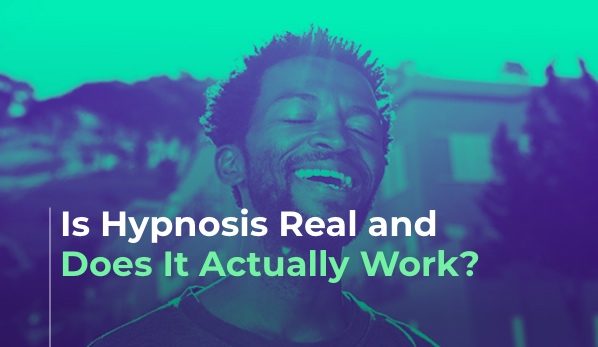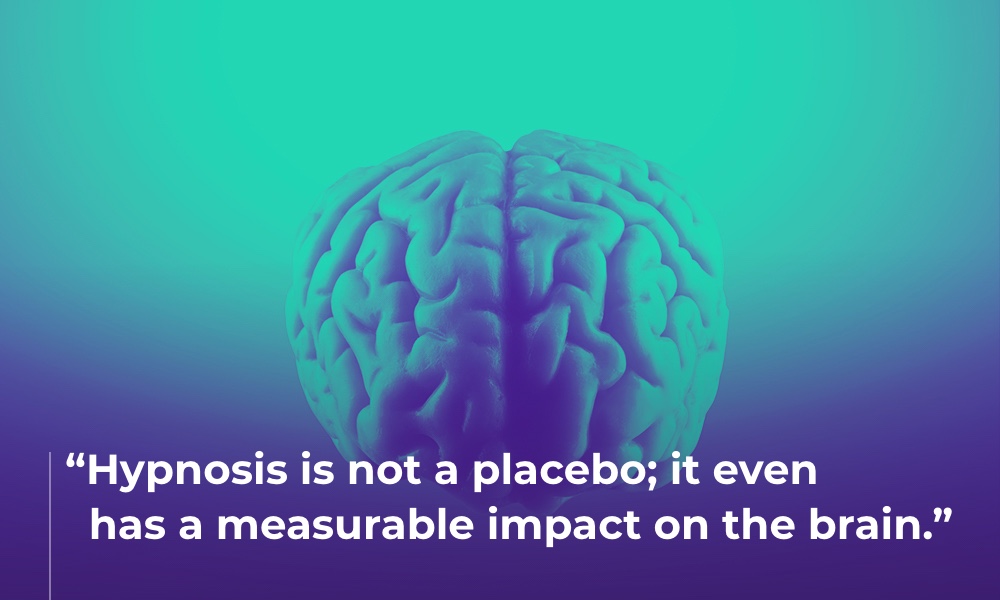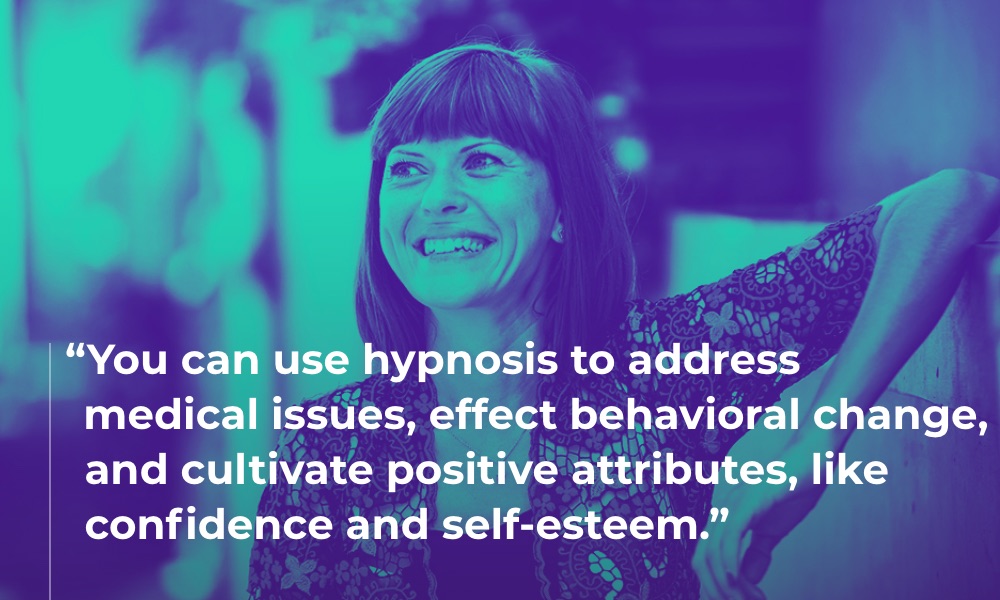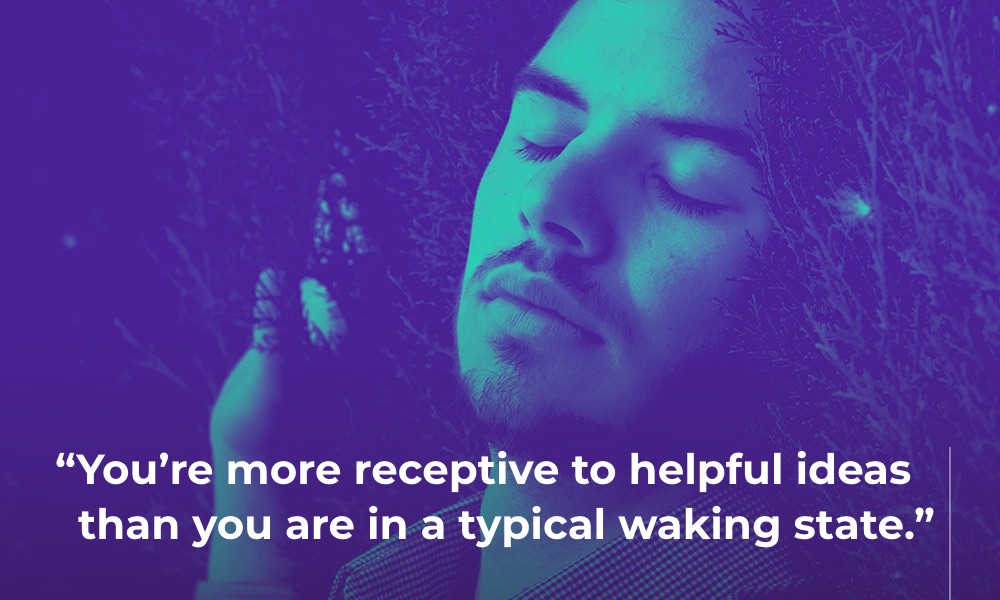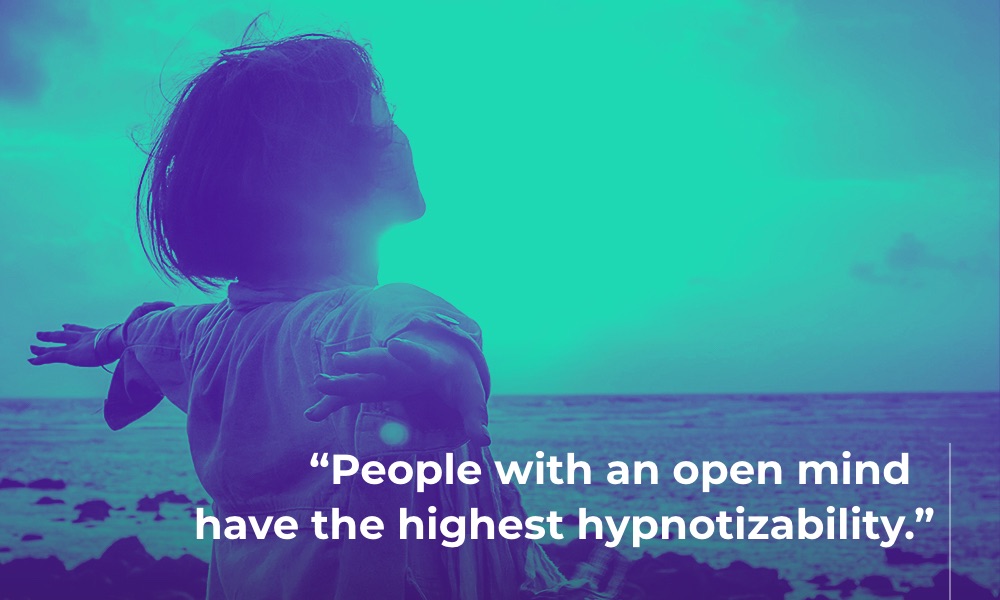Is hypnosis real? Does hypnosis actually work? If you heard about hypnosis through pop culture, you’ve likely wondered these questions. Or perhaps you learned about hypnosis from a friend who used it to quit smoking or lose weight. That may have you wondering: Can hypnosis benefit me? The good news is that not only is hypnosis real, but it’s also effective, and it can most likely benefit you.
In this article, we explore what hypnosis is, how it works, and what you can use it for. (Here’s a hint: you can actually use it for dozens of things—from helping you build confidence to improving your athletic performance.) We also dispel some of the common misconceptions about hypnosis and answer some of your burning questions. Let’s dive in!
What is Hypnosis?
Before we explore the effectiveness of hypnosis, we must understand what it is. Hypnosis—whether you’re doing self-hypnosis, clinical hypnosis, or using a guided hypnosis app—is a type of therapeutic meditation.
During hypnosis, you’re guided into a calm, focused, and trance-like state. In this state, you gain access to your subconscious mind. This is what houses all of your core beliefs, fears, traumas, and patterns that motivate your thoughts and behaviors. When you’re in a hypnotic state, you can identify the self-limiting ideas in your subconscious and replace them with helpful suggestions. When you’re hypnotized, you’re very focused, and you’re more receptive than usual to helpful hypnotic suggestions that you hear.
Hypnosis Misconceptions
There are a lot of misconceptions about hypnosis. But being in a hypnotic state is not an entirely foreign feeling. In fact, it feels similar to when you’re reading a captivating book or watching a fascinating movie.
It’s also important to note that hypnosis is not “mind control.” A hypnotist cannot make you do anything you don’t want to do; you have to consent to the suggestions provided to you in order for them to work.
Keep in mind that a typical hypnosis session is nothing like the stage hypnosis you see at hypnosis shows.
And sessions don’t typically include pocket watches or anything else you’ve likely seen in pop culture. Hypnosis is a proven way to break through barriers and reach your goals—whatever they may be!
Is Hypnosis Real?
Yes, hypnosis is real! It’s a scientifically backed treatment that’s trusted by clinical professionals in a variety of fields—from sports to medicine. Hypnosis has been used with great results by some of the world’s most successful people, including Thomas Edison, Mozart, Albert Einstein, Tiger Woods, Brittany Bowe, The Chicago White Sox, Bruce Willis, Julia Roberts, and Drew Barrymore, to name just a few!
Hypnosis is not a placebo; it even has a measurable impact on the brain. In fact, David Spiegel wrote in a 2016 Stanford University Medical School study that hypnosis affects activity in parts of the brain that process information.
For example, when you’re hypnotized, activity decreases in your dorsal anterior cingulate. This is the part of your brain that processes incoming information. As a result of this diminished activity, your subconscious can take center stage, giving you greater access to deeply-rooted beliefs, fears, and memories.
Hypnosis also allows for a stronger connection between your executive control network and your insula, which controls the mind-body connection. This allows you to take in information at an intellectual level and at a core functional level. This is especially helpful when you’re using hypnotism to address a bodily issue, like a sports injury.
Finally hypnosis temporarily reduces the connection between your executive control network and your default mode network. This helps you bypass limiting thought patterns and develop new, more helpful ones.
What Can Hypnosis Be Used For?
You can use hypnosis to address medical issues, effect behavioral change, and cultivate positive attributes, like confidence and self-esteem. Among other things, science shows that the use of hypnosis can help with:
- Falling asleep more quickly
- Reducing stress and anxiety levels
- Calming fears
- Improving self-esteem
- Having better control over your mindset
- Enhancing focus
- Combating Irritable Bowel Syndrome (IBS)
- Managing pain (even pain during childbirth)
- Combatting depression
Hypnosis can also help you make improvements to your well-being and mental health, such as:
- Improving self-esteem and self-confidence
- Breaking bad habits like procrastination
- Increasing motivation and concentration
- Reducing worry and stress levels
- Improving mental and physical performance
- Enhancing memory and creativity
Hypnosis is also an excellent complement to other wellness practices, like mindfulness meditation, psychotherapy, psychiatry, and cognitive behavioral therapy. Using hypnosis in conjunction with other practices can help you see even better results.
Hypnosis Success Stories
Many people have found success using Primed Mind, an app that brings the power of hypnosis and meditation to your smartphone or tablet. Here are some real user reviews:
- “I’ve had many guided meditation apps and this one mixes the feeling of meditation with a sense of purpose. I feel relaxed with a lazer-like focus after completing one of the exercises. There are a number of guided meditations specific [to] different outcomes. You’ve got health, habits, mindset, calm, sleep, feel good, etc and each is aimed at helping get you to a quality emotional state to accomplish the thing you’re pursuing. I’d recommend this for anyone with paralysis by over analysis, and encourage that person to complete Primed Mind’s one page productivity planner prior to going through one of the 15 min exercises in the app. This will help you establish a goal to complete for the day and give you the fuel and calmness of mind to pursue the goal.” – DMW1212120
- “I love this app. I try quite a few different meditation apps and I really like the topics and focus of the app. The pace and rhythm is great. It’s not flowery, there are some good concrete meditations. As someone who is focused on self efficacy, performance and being an authentic self I find this app really serves me well, I always leave feeling solid and focused.” – Alex C 82
- “Whenever a tool has the power to shift your state of mind, you should use it often. Sometimes it is hard for us to immediately switch our mindset even if we know it is not serving us well. The ego is tied to the self-limiting belief that we can not immediately change our state to one of purity and positivity. Well it is tools like Primed Mind that help get us there when we cannot yet do it on our own.” – BlueJacket924
How Does Hypnosis Work?
During a hypnosis session, a hypnotist or hypnotherapist will help you relax into a calm state of mind. In this hypnotic trance, you can easily reach your subconscious. Once you have access to your subconscious, your app or hypnotherapist will use different hypnosis techniques to identify and alter the beliefs, traumas, fears, and motivations that are controlling your behavior. There are many hypnosis techniques (such as regression, visualization, and suggestion) that can help you achieve your goals.
In this hypnotized state, you’re more receptive to helpful ideas than you are in a typical waking state. Once you’re brought out of your hypnotic trance, you’ll be able to effortlessly act upon the ideas you heard.
What Happens During a Hypnosis Session?
Hypnosis sessions can vary depending on the type of hypnosis you’re doing. But regardless of the type, hypnosis leads you into different states of consciousness than your normal, waking state of consciousness. Today, let’s walk through what a typical suggestion-based hypnotherapy session looks like.
In the induction phase of a suggestion hypnosis session, your hypnotherapist or hypnosis app gently guides you into a hypnotic trance using visualization, imagery, counting, music, and other techniques.
Once you’re in the trance, you’ve bypassed the conscious part of your mind, and you’re more receptive to helpful suggestions you hear.
Some hypnotic primers also include a deepening phase, which pulls you even deeper into a hypnotic trance.
In the suggestion phase, the hypnotist or app makes helpful suggestions to your subconscious mind.
These suggestions are tailored to the goal you want to achieve your goal. For example, if you want to quit smoking, you might hear the suggestion: “Notice how much better, how much more energized, you feel now being a non-smoker. You don’t want to smoke because you are living a healthy, happy, and fulfilled life.”
In the final phase, the hypnotist or app gently brings you out of the hypnotic trance with music, counting, and other techniques. You can then return to your “normal” life, better equipped than ever to achieve your goals.
Most people find hypnosis to be a relaxing and enjoyable experience, and many start to see results after their first session.
Frequently Asked Questions About Hypnosis
If you’re new to hypnosis, it’s natural to have questions. Here are some of the ones we hear most often:
Is One Hypnotherapy Session Enough to See Results?
In many cases, one session is enough to start to see results, and you’ll continue to get better results as you continue to do more sessions. Many high performers treat hypnosis like any other part of their performance routine. Some choose self-hypnosis to hypnotize themselves. Others use hypnotherapists or hypnosis apps for weekly hypnosis sessions.
Does Hypnosis Work for Everyone?
Most people are hypnotizable. Anyone who can enter a meditative state (which is nearly anyone!) can also enter a hypnotic state. That said, hypnosis works best when you come to it with an open mind. If you’ve tried hypnosis before and it didn’t work well for you, you may have wondered: Why can’t I be hypnotized? It could be because you believed it wouldn’t work. Believing that it will work increases your suggestibility. In other words, people with an open mind have the highest hypnotizability.
Is Hypnosis Real for Weight Loss?
Yes, hypnosis for weight loss is real. Studies show that combining hypnosis with diet and exercises leads to longer-term weight loss than diet and exercise alone. Hypnosis for weight loss works by helping you identify and address the underlying causes of your eating behaviors.
Are You Asleep During Hypnosis?
You are not asleep during hypnosis. Hypnosis puts you into a very relaxed state, so to an outside observer, you may look asleep. However, you’re actually very alert and focused on the suggestions you’re hearing.
Does Hypnosis Have Any Risks?
For the vast majority of people, hypnosis has no risk. Some people may feel anxious before their session (the way you would before any new and unfamiliar experience). But because hypnosis is so relaxing, anxiety often fades once the session begins. If you have any concerns, speak with your healthcare professional before trying hypnosis.
Using Primed Mind for Hypnosis at Home
Hypnotism is a real and effective therapy for a variety of goals—from weight loss and gaining confidence, to pain management and smoking cessation. It can be an excellent solution to try before other treatments with high price tags and worrisome side effects. If you’d like to learn more about hypnosis, check out our ultimate guide on hypnosis.
Primed Mind is a hypnosis app that makes hypnosis sessions available to you at home, from your phone or tablet. Created by one of the world’s leading mindset coaches, it’s free to download and access 5-20 minute sessions on topics ranging from relaxation and boosting your energy to learning from failure and embracing big change. Try incorporating it into your wellness routine today for free.

